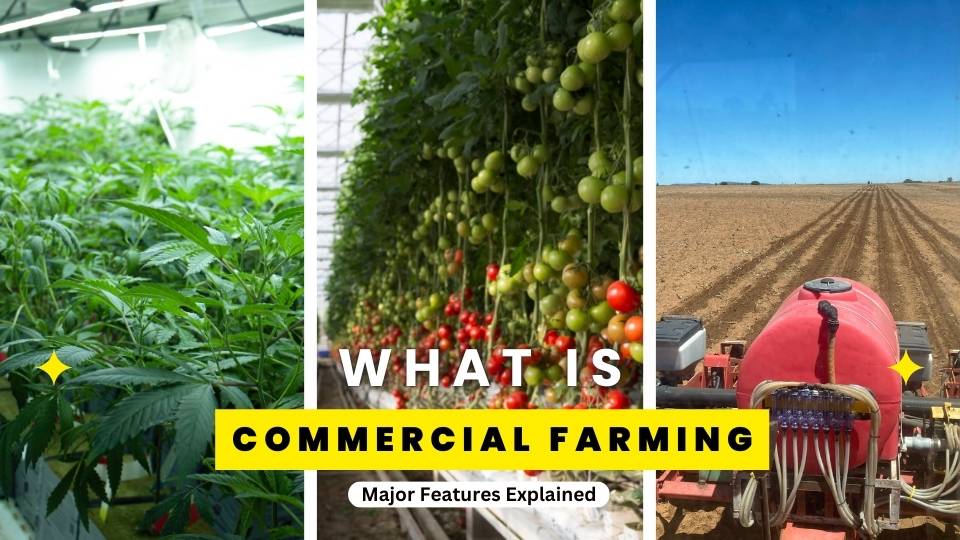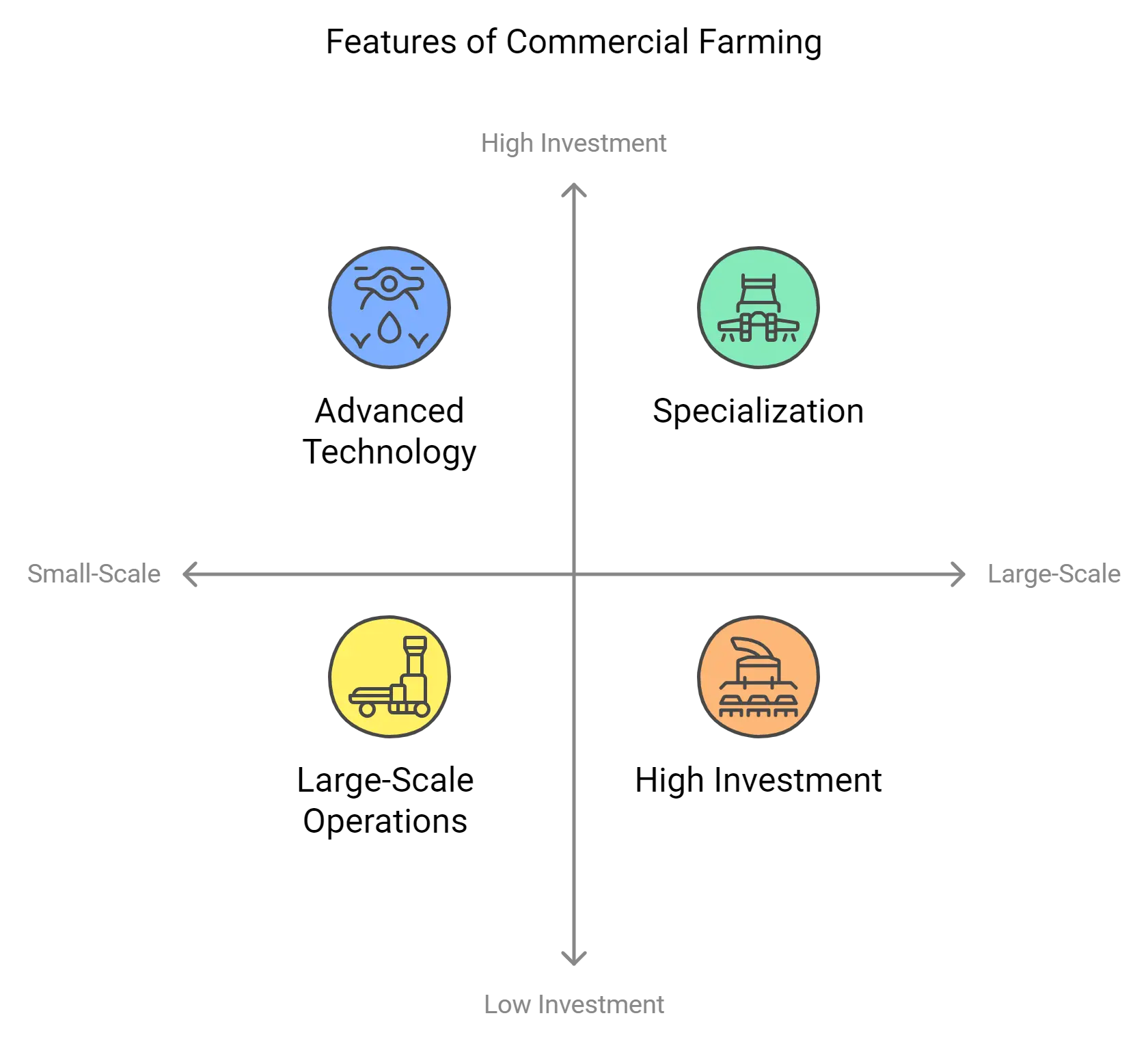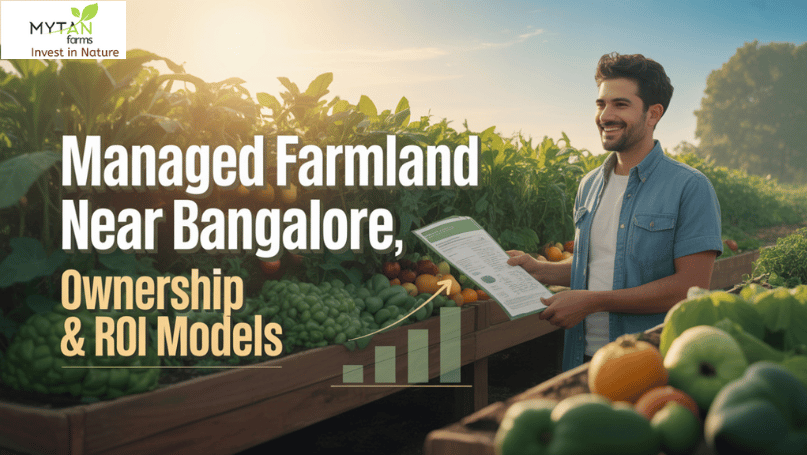
Commercial farming in Bangalore is large-scale crop and livestock production for sale purposes in the market. Commercial farming employs modern technology, machines, and methods to produce super high yields and output.
We all know what farming is, a technique of raising crops and cultivating plants for food, clothing, and other societal uses. But what is commercial farming? When the word “commercial” is added, it means the focus shifts to profit. Commercial farming refers to growing crops or raising livestock specifically for sale and profit.
But farming for commercial purposes is not farming. When the word commercial is added, it means money or profit. Technically, commercial farming means to grow crops or livestock for sale to make profits.
This farming plays a very important role for farmers and industries, agribusiness corporations, and consumers.
Suppose you want to do commercial farming successfully. In that case, you have to keep certain important things in mind, such as choosing a good location with better soil quality, water availability, and access to markets.
These factors will help you understand the yield, sustainability, and profitability of the farm, making agricultural land in Bangalore an important consideration for everyone who wants to enter this field
Features of Commercial Farming in Bangalore

Large scale operations
We know many of you want to do commercial farming because of its large-scale nature.
Regular or traditional farming focuses more on small plot of land because the work is done more by humans instead of machines, in commercial farming farms are spread over hundreds or even thousands of acres.
The reason behind is, on large land machines can work properly such as tractors,combines, and automated irrigation systems. With the help of these features of commercial farming you can do more efficient production which will give you higher outputs.
High investment and profit oriented
If you want to do commercial farming, keep in mind that you should have a substantial amount in hand to make all the necessary investments in machines, land, or other materials such as fertilizers and pesticides. Investing in farmland in Bangalore can provide the right foundation for successful commercial farming
These farms are profit-oriented, which will give you high productivity and maximum returns.
Use of advance technology
Today’s commercial farming, and the agriculture industry at large, hinges on extensive use of technology. Technology in farming is everywhere, from the GPS tractors to the irrigation systems, the genetically modified crops all are used to boost yield.
These features of commercial farming permit efficient farming activities so that less water, time or money is used, and more yield from crops or livestock is produced.
Specialization
Commercial farms focus more on a specific crop such as wheat, cotton, or soyabeans, or specialize in livestock like cattle or poultry.
This helps farmers a lot as they can specialize in growing a specific crop and optimise their production process to give maximum outputs.
Types of commercial farming in Bangalore
There are four typers of commercial farming:
Crop farming
Crop farming is act of growing crops such as wheat, corn or rice on a large scale, and then selling those crops to the national and international markets with high productivity caused by the usage of high quality machines in production of those crops.
Industrialized crop agriculture contributes to the world food needs through supplying a large proportion of the basic foods eaten by people all over the world.
Livestock farming
In animal farming, animals such as cow, poultry and pork are reared for meat, milk or other related products.
Industrially raised livestock farming operates in mass production in order to feed populace as well as export markets. This includes the large scale producers like Amul and Mother dairy that supply copious amounts of milk for the India population.
Mixed farming
In simple terms, it is a system that makes it possible to grow crops and rear animals within the same production unit, or farm.Doing agriculture in this way you can generate much more income as when you will sell crops and animal products simultaneously, you will be much more richer than by selling crops only. as when you will sell both crops and livestock products then you will earn more income than selling crops.
It also permit improved agriculture as dung from the animal can be good for the improvement of soils for crops.
Plantation farming
Special products such as coffee, tea, cane sugar or rubber are generally cultivated on a large scale in plantation farming.
Such kind of farming involves a lot of manpower and can be practices majorly in the hot areas of the world. More emphasis is placed on establishing higher value cash crops which the world market demands.
Examples of Commerical Farming in Bangalore
Examples of different regions
In fact there is large number of real case studies available around the globe where modern form of commercial farming has been benefited. In the United States, the Midwest is the home of vast and agribusiness-oriented, corn and soybean plantations. In Brazil, few large scale industries of sugarcane plantation are the leaders of the bio fuel market. These examples tell about how the commercial farming adjusts itself to the regions and markets.
Commercial farming in Bangalore
Hence it is very apparent to see Bangalore as the fastest growing commercial farming technology as it has got good climate and infrastructure and close to industries.
Businesses such as Mytan Farms are at the vanguard of this revolution or progressive farming that is sustainable and profitable.
Mytan farms has adopted modern technology and follow the environmentally friendly method of farming to make it more efficient and profitable meaning that it is one of the best commercial farms in Bangalore.
Key Factors to Consider for Commercial Farming

Location
One of the most important factors in commercial farming is location. Access to markets, accessibility to transport routes, and the availability of resources such as water and labor can all impact profitability.
Soil quality and availability of water
For high yield in commercial farming, soil quality is paramount. Regular soil testing helps determine the right nutrients required for optimal crop growth.
Sustainable water usage is equally important, especially in regions with limited water supplies. Ensuring a reliable source of water through irrigation systems can significantly impact farm productivity.
Climate considerations
Different crops and livestock require specific climate conditions to thrive. Understanding the local climate is essential when choosing what to farm. For instance, crops like coffee or tea thrive in tropical climates, while wheat or barley is better suited for temperate regions.
Access to markets
The success of commercial farming in Bangalore or wherever is heavily dependent on access to markets. Farms located near major cities or ports have an advantage in selling their products quickly and at better prices, minimizing transportation costs.
Legal aspects and regulations
As a beginner seeking to venture into commercial farming, a prospective farmer should make efforts to understand legal issues for commercial farmers, legal red tape of commercial farming such as ownership of the land, zoning laws and environmental standards. Noncompliance with these laws may result in a legal battle or consequences that could unswing your farm’s profit making margin..
Land prices and return on investment
The land costs are escalating in areas such as Bangalore; therefore, it’s worthwhile to discuss the cost implication of land for commercial farming. But if the plan is laid well and the farm well managed, then the return is good and a worthy investment can be made.
Commercial Farming and Agribusiness Corporations
Integration with Agribusiness
Commercial farming often involves collaboration with agribusiness corporations, which buy raw materials from farmers for processing and distribution. This relationship allows farmers to have a consistent buyer for their products, ensuring regular income.
Supply chain and distribution
The supply chain for commercial farming is extensive, linking farms to industries and consumers. Understanding the logistics of getting crops or livestock from the farm to the market is crucial for ensuring profitability and reducing losses.
Why Choose Commercial Farming in Bangalore?
Bangalore as an emerging hub
In this regard, commercial farming in Bangalore is due to factors such as its advantageous location, favourable climate and physical infrastructure. The city is quickly becoming a focal point of the agricultural food chain, with considerable numbers of investors, both domestic and foreign.
Mytan Farms as a Key Player
Mytan Farms is leading the charge in commercial farming in Bangalore, combining sustainability with profitability. The farm is dedicated to providing clients with high-quality, scientifically developed farmland that is both affordable and sustainable. As a corporate agro realty company, Mytan Farms supports clients with expert-backed farming solutions.

Conclusion
It is profitability that was perhaps seen best through the following commercial farming in Bangalore opportunities where in any commercial farming venture there are some factors that should be put into consideration such as the area of the farm, quality of the land, weather conditions and market accessibility.
Companies like Mytan Farms in Bangalore are on the forefront in embracing the use of modern technology to achieve high returns on investment.
Today, Mytan Farms remains compliant with the current technologies and environmental conservation instruments in agriculture to boost the farming sector in Bangalore.




